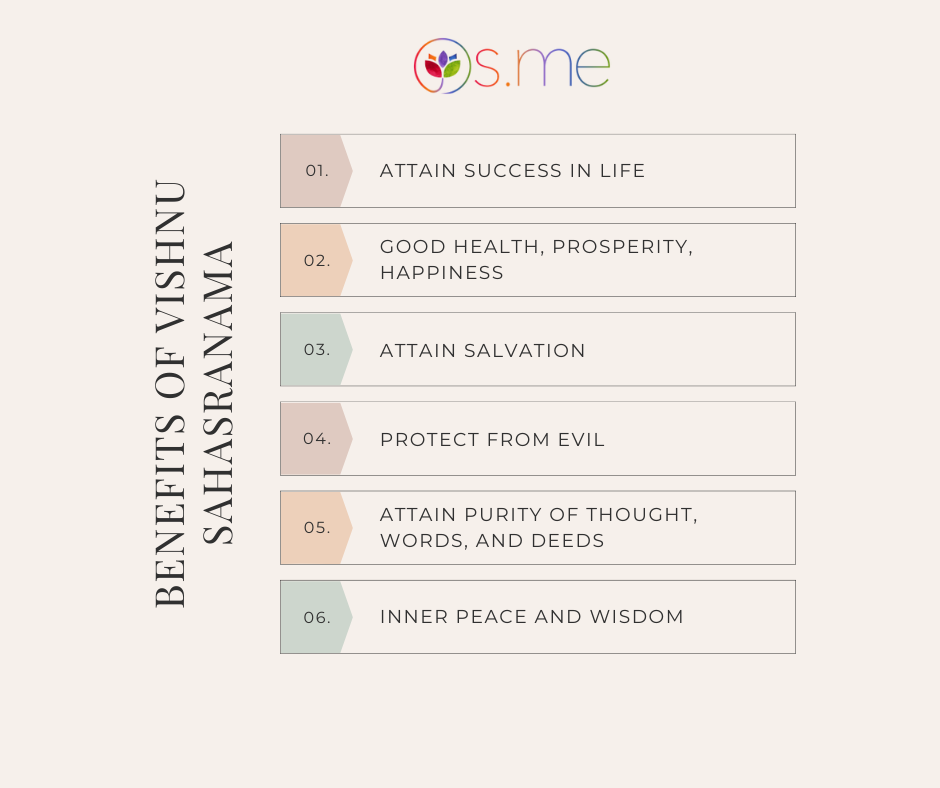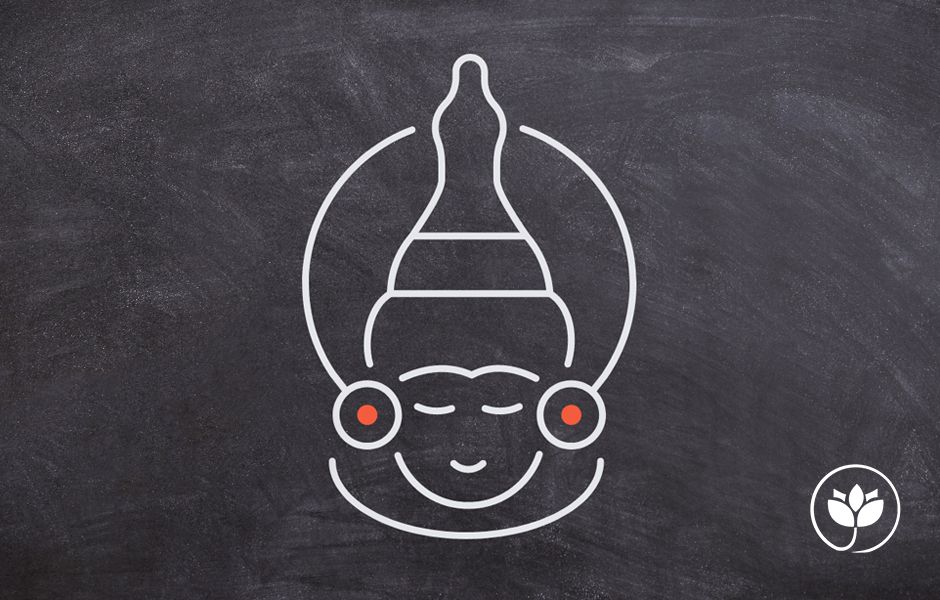Vishnu Sahasranamam and its unique meanings
The Vishnu Sahasranamam is an ancient holy Vedic hymn containing one thousand names of Lord Vishnu. The Vishnu Sahasranamam, commonly chanted as a strotam, includes these names arranged across 107 stanzas. Lord Vishnu, also known as MahaVishnu or Narayana, protects and preserves the Universe.
The general depiction is that He rests on the king of snakes named Kalswarup Seshnag, with his consort, Goddess Laxmi, sitting by his side. Devotion towards Lord Vishnu and worshiping Him brings inner peace, success, and detachment to the devotee. Each name in the Sahasranamam has a profound meaning and refers to a particular characteristic, quality, or attribute of Lord Vishnu.
The purpose of chanting these names is to invoke a sense of bonding and love with the Lord. Each meaning gives us insight, understanding, and depth into the nature of God.
In a Sahasranamam, there is a deep connection between the name and the named, i.e., Lord Vishnu in this case. You’ll notice that some words repeat twice or more. However, their significance differs hence chanted as part of the hymn.
In addition to the specific meaning of each name of Sri Vishnu, the phonetic vibrations also play a significant role if a seeker wants to chant this powerful hymn.
Vibrations are produced by chanting each name, also known as Nama, and subsequently the chain of consecutive names, known as Namavali. These energy vibrations are essential for bonding, one-pointed focus, insight, wisdom, realization, and true perception of Lord Vishnu.
As Om Swami describes, while talking about self-realization, the entire goal of human life is to merge into the universal consciousness and become liberated, which is what the first verse of the Vishnu Sahasranamam means. We eulogize the Lord through this hymn, chanting it as Sahasranamam.
When an individual is close and has deep bonds with another person, they usually give them various names lovingly. The same applies to Divine love and worship. The idea is that when a seeker drowns in devotional sentiment for their deity, they chant the various names of the Lord out of gratitude and love to understand Him better and communicate with Him.
“Praying is your method of connecting with him, and Grace is His method of connecting with you. When you call and say ‘hello,’ that is praying; when He answers back, that is grace; sometimes, He calls back later.” ~ Om Swami, os.me
Additionally, prayers are a means for self-purification and mental cleansing when chanted with sincerity and devotion.
The importance of chanting Sri Vishnu Sahasranama is that the worshipping deity is none other than Vasudeva, the sustainer of the Universe, who only wants what’s best for us.
The First Version of Vishnu Sahasranama
King Yudhisthira approached his grandsire Mahamana Bhishma after the war of Mahabharat was over, seeking answers to spiritual questions:
- Who is the Lord of this Universe? Who is the ultimate refuge of a human?
- What is the way to attain the ultimate state of purity?
- Whom should we call out to – to set us free from the shackles of this world?
It is then that, while lying on the bed of arrows, Mahamana Bhishma gave Yudhisthira the one thousand names of Lord Vishnu, now known as Vishnu Sahasranamam. There are numerous versions of Vishnu Sahasranamam, but the most commonly chanted ones are from Skanda Purana and Mahabharata.
Why is Vishnu Sahasranama powerful?
An essential part of our lives consists of us calling out to the divine. During hardships, pain, and sorrow, we pray to him and approach him with gratitude when we are happy, thanking him for all the grace showered on us.
Vishnu Sahasranamam is said to be so powerful that it is like dialing a direct call to God. So, for the devotees of Lord Vishnu and otherwise, Vishnu Sahasranamam’s importance is evident, as the scriptures extensively mention its benefits.
Lord Krishna himself chanted Vishnu Sahasranamam (an incarnation of Lord Vishnu). He chanted it to calm down a destructive fire, and during the Dwapar Yug, when Kauravas were on the verge of defeating the Pandavas due to a potent weapon called the “Brahmastra,” which when used in the war could have caused a lot of destruction.
How to chant the Vishnu Saharanamam?
Chanting the Vishnu Saharanamam gives immense peace to one’s mind. One can chant as many times as one wishes to. The most popular ways are:
1. Mantra meditation (Japa),
2. Worship (Archana), or
3. Recitation (Parayana).
For an absolutely clear pronunciation, you can watch this beautiful video of beautiful Vishnu Sahsranama sung in the voice of Swami Vidyananda Om on the eve of live abhishekam done on Krishna Janmashtami.
Rejoice in seeing the abhishekam of Sri Hari done with utmost devotion and various unguents and other offerings such as water from Giri Ganga, cow’s milk, yogurt, sandwalwood water, honey, fragrant concoction, turmeric while the glorious chants of Vishnu Sahasranamam are recited in the background.
The most common way is through the daily recitation of one thousand names. If appropriately pronounced with a great bhava (devotional sentiment), Vishnu Sahasranamam can work wonders on an individual’s overall spiritual, emotional, and material development.
The correct way to chant Vishnu Sahasranamam is by understanding the meaning of each name and internalizing it. It is done by contemplating the name and evoking the feeling of love and devotion within one’s heart.
Mindful recitation with devotion helps the devotee reap the immense benefits of Vishnu Sahasranamam. Mechanical recitation without devotional sentiment would not be as effective because Sahasranamam is a devotional eulogy.
It is perfectly okay to take breaks and learn the hymn slowly, as the primary purpose is to remain mindful and established in devotion during recitation. Hence, one should chant Lord Vishnu’s names with devotion and concentration. It is a belief that one can attain salvation by doing so.
Such a holy bond between the devotee and Lord Vishnu, their deity, is the goal of all worship as stated by Lord Krishna Himself in the Bhagavad Gita:
“But those who dedicate all their actions to Me, regarding Me as the Supreme goal, worshiping Me and meditating on Me with exclusive devotion, O Parth, I swiftly deliver them from the ocean of birth and death, for their consciousness is united with Me.” ~ Bhagavad Gita, Verse 12.6-12.7
Benefits of Chanting Vishnu Sahasranama

As per the slokas mentioned in Markandeya Puranam and other such texts, a householder who chants Vishnu Sahasranama daily will:
1. Attain success in life;
2. He will have more material wealth, more food and clothing, he will live for a long time possessing good health, and his mind will be cheerful.
3. A devotee who aims to attain salvation can achieve it through Vishnu Sahasranamam chanting.
4. It is also a belief that this hymn creates a protective shield around you and your family, protecting you from all evil.
Vishnu Sahasranamam calms our minds and gives our body and soul strength to face all the challenges in life. Various additional benefits come from the mindful recitation of this chant:
1. It removes all the obstacles from one’s life and can help you get rid of your debts.
2. It makes you sanctimonious and virtuous throughout your life; hence one should ideally chant it daily.
3. Doing regularly with devotion and faith relieves the devotee from stress, sorrow, and pain.
4. It brings prosperity to the family.
5. Blessings of Lord Vishnu help one to understand the ultimate truth and walk the path of salvation.
6. Chanting Vishnu Sahasranama helps achieve inner peace and wisdom.
7. It deepens our devotion towards Lord Vishnu, especially by internalizing each name.
8. Chanting this divine hymn removes the fear of death.
9. Regular practice makes one fearless, self-confident, and conquering evil thoughts.
10. It can help us attain purity of thought, words, and deeds.
11. The actual reality behind this Universe reveals itself to us.
12. As a result of chanting this hymn, we can negate all bondages and lead ourselves to liberation from the cycle of life & death
13. Since Vishnu Sahasranama helps us purify ourselves, our intentions become clear and pure, leading to attaining desires. However, as their devotion and love for the Divine increases, true devotees naturally become so content that the fulfillment of their desires no longer remains a goal.
How to recite and pronounce the Vishnu Sahasranamam correctly?
As correct pronunciation is essential to create the right vibrations within us and connect with Lord Vishnu, a devotee should learn the correct way to pronounce the names in Vishnu Sahasranamam.
The very learned monk, Swami Vidyananda Om, the first disciple of Om Swami, goes through the intricate details and the right way to chant the Sahasranamam. Anyone who wishes to chant it will benefit significantly from this course which elaborates on and helps us to learn the Vishnu Sahasranamam.
You can also benefit from a sample giving you access to a free lesson from the Vishnu Saharasnamam course.
Q&A and real-life experiences from os.me community on Vishnu Sahasranama
How many of you chant the Vishnu Sahasranama and / or Lalitha Sahasranama daily?
How has your experience been? How long does it take to see the effects of improvement or transformation in one’s life? Did you take a Sankalpa before chanting? How long have you been chanting? Etc. Please feel free to add more information as it pleases you.
Read the answers, learn more about the experiences of chanting1000 times or ask a question about Vishnu Sahasranamam.
Where can I read more about the Vishnu Sahasranamam and its verses?
“The names in Vishnu Sahasranama offer a lot to contemplate. The more we contemplate, the more we get absorbed in its beauty. It took a few years before the interest in the Vishnu Sahasranama expanded from mere chanting to knowing a little bit more about its purpose, meanings of the names, and significance.
Soon this large body of study became too large to contain in a group. This careful contemplation of Bhagwan’s names in Vishnu Sahasranama is now translated into a consolidated website for easy reference, accessible to everyone for reflecting on the holy names of Lord Vishnu. Detailed insights into the first ten verses of the Vishnu Sahasranama have been uploaded on the website as we continue this sadhana of Naam Smaran, Chintan, and Manan, walking into Lord Vishnu’s celestial abode – The Vaikuntha. True Vaikuntha is where HIS glories are sung with devotion.”
Vaikunthanath is an in-depth website dedicated solely to the narration explanation of Vishnu Sahasranamam and where the glories of Lord Vishnu are elaborated upon. With the blessings of Sri Hari (Lord Vishnu) and Om Swami, this source of information was put together by devotees and disciples of Om Swami. They have first-hand experiences of chanting Vishnu Sahasranamam. Delve into the background story of Vaikunthanath and start your journey of understanding the Vishnu Sahasranamam.
Is the Vishnu Sahasranamam used for worship?
At Sri Badrika Ashram, Lord Vishnu (referred to as Sri Hari by devotees), the presiding deity of the temple situated in the Himalayas, is woken up every morning, and the Vishnu Sahasranamam is chanted there. Swami Vidyananda Om shared an account of the event when Sri Hari was consecrated:
“In the past, I had witnessed countless miracles in Gurudev’s (Om Swami’s) presence, but this day was unlike any other. Behind closed doors, the mystical came to life from stone and flesh. One was the dark Vigraha, sculpted of black granite – silent, watchful, still – the Lord immanent awaiting. And the other: the living, moving, breathing one performing the Dashamaha mudra (ten great mudras) with swift, graceful movements of His fingers. This is a set of special mudras performed by the practitioners of Sri Vidya to invoke the Para Shakti, the supreme Goddess. Its significance is such that it can scarce be explained in a book. Myriad things defy explanation with Gurudev, anyway.”
An os.me member beautifully writes about her devotional sentiment about the ancient Vishnu Sahasranamam in this post and shares some unique photographs as a bonus.
What are the other Sahasranamas available?
The os.me community is familiar with the various Sahasranamas available, many of which are available on the Sadhana App, including the Krishna Sahasranamam, Durga Sahasranama, Lakshmi Sahasranama, etc.
There is also the Shiva Shasranama, which is a lesser-known hymn.
“Rishis ask Sri Sut some questions; he then tells them once Skand (Kartikeya) approached Sadashiva♥ with some questions about sadhana, etc. Sadashiva then narrates the Shiva Sahasranama, 1008 names dear to him, which he once told Parvati in Kashi.”
On the occasion of Maha Shivaratri, an os.me member elaborates on the Shiva Sahasranama in his post, where you can read more about Mahadev, i.e., Lord Shiva.
What is the Lalitha Sahasranama?
“I was attracted to the word “Divine Mother.” I used to believe that I, too, talked to Lord Venkateshwara until I was 20 years old. I didn’t take it seriously at first, but after he revealed one incident to me, I realized he was not an ordinary person like me. He is a pure soul; whatever he says, the words are pure wisdom. The incident is when this divine person met our beloved guru, OmSwami Ji, on the first day. He said to Swami Ji, “Swami Ji, I would like to surrender you.” Swami Ji told him, “You already surrendered to me ten years ago.” […] He stated, “You have received the guru’s blessing; you will learn all the answers, and the divine mother will reveal everything to you.”
As a collective resolve, os.me community members took to learning one thousand names of Lalitha Sahasranama. You can learn about experiences related to this divine hymn in this post.










Comments are closed as per the author's request.
0 COMMENTS
Please login to read members' comments and participate in the discussion.